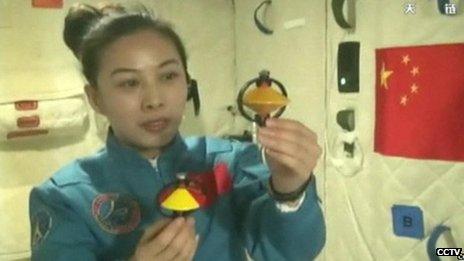China to launch space station by 2023
- Published

China expects to complete its first orbiting space station within a decade.
The station, in low-Earth orbit, will be able to support six crew on short-term missions and three for long-term stays.
Its design consists of three capsules - a core module attached to two laboratories - with a cargo vessel to transport supplies.
The 2023 launch target was revealed at the International Astronautical Congress (IAC) in Beijing.
According to the China Manned Space Agency, the space station will cover an area of 60 sq m.
Its core module (18.1m long) will weigh 20 to 22 metric tonnes and will be attached to two self-contained labs.
Test mission
Once operational, astronauts would be able to make long-term missions in orbit and conduct technical tests and science experiments, said Wang Zhaoyao, the director of the space agency.
But before all this, China must first test technologies in renewable life support and in-orbit refuelling.
(L-R) Liu Wang, Jing Haipeng and China's first female astronaut, Liu Yang, smiling after completing the exercise
Perfecting these would be essential for the planned station, said Xu Dazhe, general manager of China Aerospace Science and Technology Corp.
To carry out the tests, China will launch the Tiangong-2 space laboratory in around two years.
One cargo "shuttle" and several manned spaceships would be launched to dock with the Tiangong-2 at different times, Mr Xu revealed.
China became the third country to independently launch a human into space in 2003 and has been rapidly expanding its space programme ever since.
In June last year, it successfully carried out its first manual space docking, another essential step in building a space station.
Three astronauts - Liu Yang, Jing Haipeng and Liu Wang - piloted Shenzhou-9 to link up with the Tiangong-1 spacelab.
China's first female astronauts - Liu Yang and Wang Yaping - appeared together at the IAC meeting.
Liu Yang said the nation was willing to accept foreign astronauts for future missions.
The annual IAC event has about 3,600 space scientists and business people attending, representing some 74 countries from across the world.
- Published28 August 2013
- Published26 June 2013
- Published24 June 2013
- Published12 June 2013
- Published11 June 2013